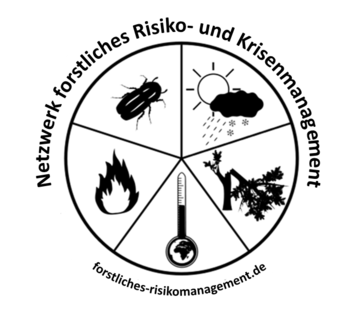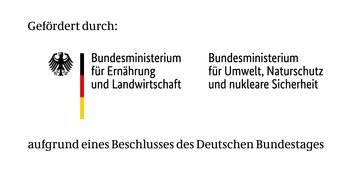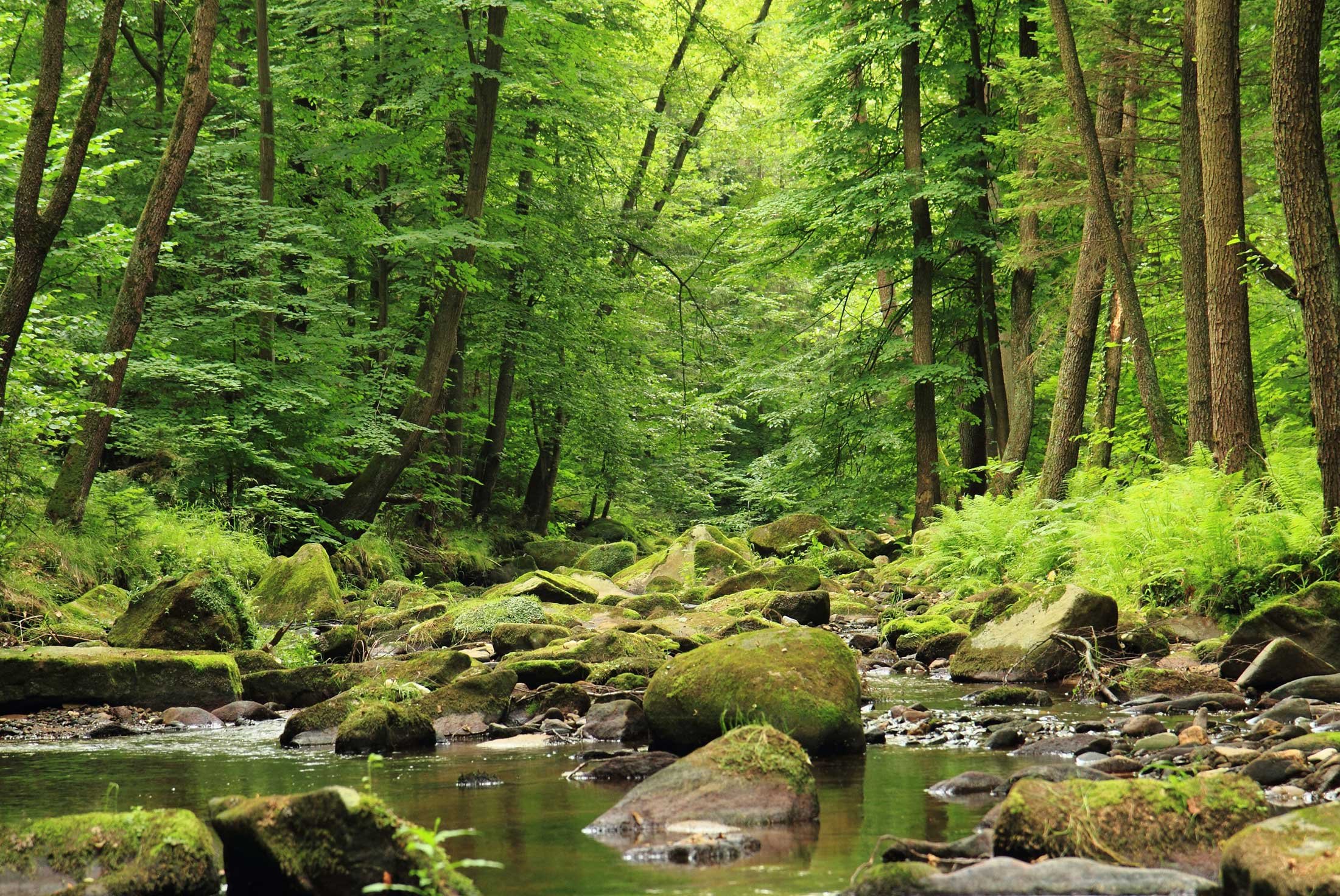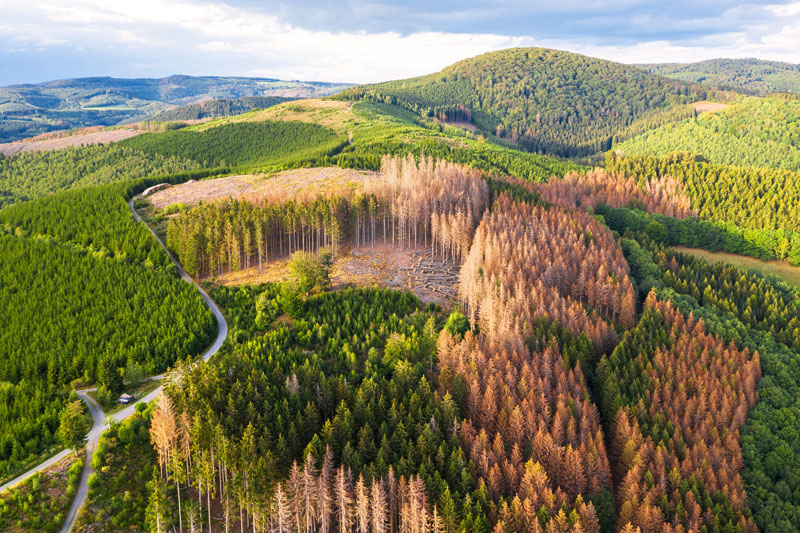Storms like “Lothar” or “Kyrill”, long periods of drought, insect outbreaks, wildfires and various other factors can have devastating consequences on forests. Climate change is on everyone’s lips along with predictions about an increase in extreme weather events. Exactly when and where the next extreme weather event will occur can not be foreseen, but that it will happen is certain.
After the “Lothar” storm in 1999 it was recognized that there was a huge need for practice orientated guidance on how to deal with the storm’s aftermath. The Storm Topic Collection, prepared in 2004 and 2005, helped many forest owners deal with storm damages in subsequent years.
Due to the great demand for practice orientated knowledge, the increase in extreme weather events and the diversity of damage causing factors, the collaborative “Prevention and Management of Forest Crises” (PuMa) project was initiated in 2008.
Forest Crises Management Advisory Guide
Forests are exposed to various weather and environmental effects stemming from, for example, storms, water, fire, or insects. Windthrow, snowbreak, forest fires, and feeding damage are potential aftermaths with sometimes devastating consequences for forests and forest holdings. Extreme weather has always been a central risk for the forestry sector. Moreover, according to the Intergovernmental Panel on Climate Change (IPCC), such extreme weather events will occur in the future with an increased intensity. However, this is no reason for resignation.
A wide range of damages can be avoided or at least minimized through prevention and good preparation. Therefore, this advisory guide encourages the active dealing with such risk factors. It raises awareness about adaptation strategies which can be useful and meaningful in the future with regard to changing climate conditions.
The advisory guide consists of different thematically defined manuals and is gradually expanding. Forest holdings and forest owners can find suggestions for professional forestry risk management. Because even with the best risk management extreme events will occur time and again, other aspects of crisis management also play an important role. In addition to silvicultural and technological content to cope with the damage caused in forests, increasingly more content and measures in the sphere of preventions and preparation are presented.
Participating Partners
Through the collaboration of the state forest enterprises and administrations in Baden-Württemberg, Mecklenburg-Western Pomerania, North Rhine-Westphalia, Rhineland-Palatine, Saxony und Schleswig-Holstein as well as the Austrian Chamber of Agriculture, a “Forest Crisis Management” advisory guide is being developed. Along with implementation and technically orientated recommendations on how to deal with forest damages, it will also contain preventative measures which can be taken before a damaging event occurs.
Range of topics in the advisory guide
Besides storms, damage causing events such as wildfires, insects, droughts, floods, snow and new pests will be included. Issues to do with general crisis management and communication during emergencies will be discussed too.
Over time the pages of the advisory guide will be filled and the range of topics expanded. The advisory guide articles appear in the relevant sections of the forestknowledge.net and can be recognised by the advisory guide logo.
Update and Maintenance of the Advisory Guide


















The advisory guide is updated and further developed as part of the project KoNeKKTiW. Our network partners ensure that the content shown is practical. All content is agreed on before its release. The contributions of the guide appear in the respective section of waldwissen.net and are marked with the project logo. The following organisations participate in KoNeKKTiW:
KoNeKKTiW is funded by the Federal Ministry of Food and Agriculture and the Federal Environment Ministry following a decision by the German Bundestag within the framework of the Forest Climate Fund.
Further Information
We invite you to use the comments tool. Your feedback will help us to further improve the advisory guide.
The "Forest Crisis Management" Advisory Guide is only available online at forestknowledge.net. We want to keep the articles up-to-date and have therefore consciously decided against a hardcopy version. All of the articles can be directly printed as print versions. Some articles have been collated together and are available to download as a PDF document.
Copyright
Unless otherwise stated, the copyright for the texts and figures within the advisory guide remain with the KoNeKKTiW project or the network and alliance partners, the Federal Ministry of Food and Agriculture, as well as the Federal Environment Ministry.
The use of the content is only permitted by citing the source (waldwissen.net), title and authorship of the corresponding article. For further questions, please contact the Department of Forest management and ecosystem services of the FVA Freiburg (for contact information see down).
History of the Online Advisory Guide
Already after storm Lothar in 1999 it became evident that there is a lack of practical guidebooks for coping with storm damage in forests. The Storm Topic Collection developed in 2004 and 2005 has already helped many forest owners in coping with damage in the following years.
The high demand for practical knowledge, the increase in extreme weather, and the variety of damages gave rise to the joint project “Prevention and Management of Crisis in the Forest” (in German: Prävention und Management Forstlicher Krisen) in 2008 and with it the online advisory guidebook “Forest Crisis Management”.
The advisory guidebook “Forest Crisis Management” emerged from the cooperation of state forest holdings and administrations of the states Baden-Württemberg, Mecklenburg-Vorpommern, North Rhine-Westphalia, Rhineland-Palatine, Saxony, and Schleswig-Holstein, as well as the Austrian Chamber of Agriculture.
Meanwhile, the KoNeKKTiW project has taken over the responsibility for maintaining and developing the online advisory guidebook and, above all, for further expanding the subject area of prevention of damage and adaptation to climate change.
Miscellaneous
The advisory guide “Forest Crisis Management” is only available online at waldwissen.net. We want to keep the information up-to-date and have thus deliberately decided against a printed version. You may of course feel free to print individual articles.
In the German version, older articles often refrain from using a gender-neutral language. Since forestry is by no means only for men, we attribute great importance to gender-appropriate language.
We welcome you to use the comment function. Your feedback will help us improve the advisory guide!
![[Translate to English:] [Translate to English:]](/assets/_processed_/4/4/csm_Logo_Netzwerk_header_e8cc08a8fc.png)




